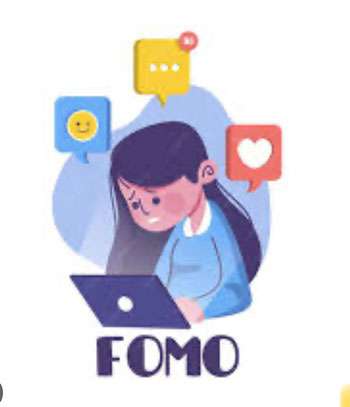
FoMO??
Posted on April 22, 2024 by Great Florida HomesBy Mindi Rudan
What it Is. Do You Have it? And a Little Primer on How to CURE if you do!
FoMO. Even the acronym sounds funny. It’s a unique term introduced in 2004 to describe a phenomenon observed on social networking sites. Eventually making it all the way to the Oxford Dictionary in 2013. Technically it’s an “abbreviation” for "fear of missing out:” A worried feeling that comes over you that you may indeed be “missing out” on exciting things that other people are doing.
And get this — it’s triggered specifically by things we see on social media.
But is it real or self-imposed or BOTH? A recent conversation with a couple of girlfriends was about just that. I said, “You girls are like Energizer bunnies. When I see how much stuff you do in a day on FB, I want to run for the “Geritol.” (Whoa, remember that!?) “I can’t keep up,” I said.
Me? I drank coffee, (yes I made it too!!), fed the zoo, watered my plants and now need a nap! Facebook, if I’m honest, HAS kinda given me FoMO at least at times. I think I say yes more than my body would like me to because I feel like I’m not keeping up.
And if that’s not weird enough: while FoMO refers to something tangible — seeing a post on social media and maybe wishing you were there—-Now there’s a new malady too: MoMO about the imagined — suspecting that a social event is happening, and you weren't invited, but having no proof. SERIOUSLY!!????
Why is it so hard to keep from comparing our lives to the lives of others?
In my mom’s day she might have been disappointed had she not been invited to a big party, a wedding or someone’s birthday. BUT she didn’t have the daily, actually momentary pressure of a FB or Instagram to shove it in her face. The telephone was what brought news of something you might have been left out of.
You had to stumble across information that now thru FACEBOOK is, well, in your face … HOURLY!
Plus it’s not just NOT being included, it’s SEEING the fun everyone is having WITHOUT you that’s triggering this new ailment called FoMO.
According to Psychiatric Times, “Today, social media continues to feed the need to live vicariously through others—except now we can actually tap into the lives of hundreds of other people whenever we want 24/7. It’s easy for hours to slip by as we scroll through the lives of others.” Therapists agree, this is when we are most vulnerable to the “trap” of FoMO: the dreaded fear of missing out. According to psychologist Dr. Abby Rosen, Ph.D, “Social media can magnify all of our insecurities. FoMO is now associated with problematic social media usage and can be experienced as a range of negative emotions and feelings related to the need to belong. Facebook and Instagram exacerbate our need to be accepted and acknowledged.”
In the beginning, FoMO is subtle. We may see an image of friends enjoying an activity together or of the perfect family taking the vacation we have always wanted. What we start to notice is that WE are conspicuously absent from all the fun. Excluded even. Perhaps our posts don’t get as many likes. When FoMO starts to rear its ugly head, victims can’t help but compare and keep score. Before long, they’re spending more and more time on social media with the intention of confirming their own worth, their own popularity. And there you have it. That’s how FoMO which sounds cute and funny becomes problematic. “When you allow your deepest insecurities to create a negative dialogue in your own head,” added Dr. Rosen.
FoMO may exist as an episodic feeling — it can happen in mid-scroll, and last a minute. But when it becomes concerning is when it becomes a state of mind that leads someone to feel a deeper sense of social inferiority, loneliness, or even anger. Today, more than ever, people are exposed to a lot of details about what others are doing. Back in the day you were subjected to reams of slides in a presentation about a relative or neighbor’s vacation. In 10 minutes on FB today, you can see 25% of your “friends” all over the globe clinking glasses in fabulous restaurants, and people are faced with the continuous uncertainty about whether they themselves are doing enough or if they are where they should be in terms of their life.
And while grown adults are starting to experience the impact of “FoMO negativity,” our young adults are feeling lonelier and more disconnected than ever.
Equate it to being “popular” in high school. Either you were or you weren’t. And if you weren’t, it didn’t feel good. Today, exacerbate THAT by a moment by moment opportunity to confirm this provided by our immediate social media access. “Comparisons” to others are now somewhat driven by the desire to attract higher likes and engagement. Not achieving this can spark frustration and lead to a distorted and negative sense of self and your own actual value. The words: YOU ARE MAKING YOURSELF CRAZY, were never so resounding.
In fact, FoMO is a big reason people choose to follow influencers: They just don’t want to miss out or NOT be in the know.
And here’s the kicker. Remember how we felt about the tobacco companies when it was uncovered that they KNOWINGLY ADDED HARMFUL INGREDIENTS TO CIGARETTES TO PURPOSELY ADDICT SMOKERS?? Well here’s news: Social media platforms knowingly tailor content to keep you coming back for more. And while that may seem trivial compared to purposefully causing cancer, think again. What’s your mental health worth?
Cross-sectional studies indicate a strong correlation between internet addiction and anxiety, attention deficit disorder, insomnia, social awkwardness, hyperactivity disorders and more!
Instagram has long been accused of knowingly stoking the flames of FoMO. Instagram’s own internal research found that 66% of girls and 40% of boys have been confronted with negative social comparisons on the platform.
In a 2021 leak, former employee and whistleblower Frances Haugen said company officials KNEW of the app’s danger to teens but did nothing to address it—even after researchers offered suggestions. Currently under investigation, Instagram’s parent company Meta (formerly Facebook) has temporarily put on hold plans to launch Instagram Kids, an app directed at users aged 13 years and younger. THEY KNOW THEY ARE ADDICTING KIDS. They send you messages that your screen time was down, and are filling your feeds with anything that keeps you scrolling.
As social media grows and shifts in its ability to influence our lives, FoMO is virtually impossible to avoid—but that doesn’t mean it cannot be controlled.
 What most people suffering from this new malady don’t really see or fully understand is that posts can be highly edited, highly skewed and greatly filtered versions of reality. It’s more like the cherry-picked perfection version. So in essence you are feeling less than, but what’s cloaking you in self-doubt is simply an edited version of reality.
What most people suffering from this new malady don’t really see or fully understand is that posts can be highly edited, highly skewed and greatly filtered versions of reality. It’s more like the cherry-picked perfection version. So in essence you are feeling less than, but what’s cloaking you in self-doubt is simply an edited version of reality.
I can look like I’m 15 with a SnapChat filter in a picture but come nose to nose with me and I might not need a Halloween mask to scare little trick or treaters! Seeing your besties holding hands in a restaurant anniversary pic all smiles may not offer access to the whopper of a fight they had getting there. They don’t post the argument.
FoMO exploits your insecurities for sure but only if you recognize it and let it. It’s hard to remember that everyone experiences struggles, setbacks, disappointments, rejection and loneliness when all you see are images of their perfect bliss. But understand that couples holding hands in the vacation pictures may not even be eating dinner together at night.
It’s ok to feel sad that you didn’t get invited to a party; what’s not ok is allowing that negative emotion to permeate and control your life. Researchers say those who are caught in the FoMO cycle are most probably those not feeling too great about their life. FoMO often originates in unhappiness. In fact, those afflicted with FoMO are people prone to check social media right after they wake up, before they go to bed and during meals. Or more!
So you’re not feeling so great — whether you realize it or not — when you turn to social media to make yourself feel better, there’s only one problem there: it actually can make you feel worse…
Recent research shows this is the happiness equivalent of taking someone with a nut allergy and putting them on an all-peanut butter diet.
This somewhat rabid consumption of Facebook also correlates to a marginal increase in depression. So what they’re suggesting is that If two women each talk to their friends the same amount of time, but one of them spends more time reading about their friends lives on Facebook as well, the one reading tends to grow slightly more depressed.
Again and again the happiness research shows: comparisons to lives that seem better than yours, well, that’s just some bad mojo. It’s not healthy; it accomplishes nothing; in fact it creates huge barriers to enjoying your own life or accomplishing your own triumphs. And never forget you are comparing your actual life to an overblown, stylized, purified and steroidal version of “their” real life.
So what’s the most common response? To post something. As if to say: Look at me! I’m cool, too!
But this only strengthens the cycle. As internet maven and co-founder of Flickr, Caterina Fake, once said: Social software is both the creator and the cure of FoMO.
People with FOMO have ambivalent feelings toward Facebook. It brings them up and slams them back down: A roller coaster of emotion. Just like the highs and lows of addiction, huh?
But posting to alleviate your own feelings of vulnerability also has an important secondary effect: by presenting your scripted version of your own awesomeness, you just made anyone who sees it feel worse. You’re spreading the virus.
Good for Meta. Great for ice cream sales. Bad for true peace of mind and tangible happiness. The key to true happiness really comes down to two words: ATTENTION and GRATITUDE.
We all have bad things we could dwell on. But they don’t bother us when we pay them no mind. “Look on the bright side” might be a cliché, but it’s also scientifically valid.
When you’re caught in the loop of FoMO you tune out the real world and tune in to the fake one — Facebook.
And that’s what the research shows: people with FoMO stop paying attention to real life and turn to social media for their happiness cure.
Paul Dolan who teaches at the London School of Economics explained the importance of “attention” in his book, Happiness by Design: Change What You Do, Not How You Think: Your happiness is determined by how YOU allocate your attention. What you attend to drives your thinking and behavior and it determines your happiness. Seeing all the wonderful things you do have and feeling grateful and lucky for them opens a very real positivity response. It’s not sappy, try it.
So the cure?
Pretty Simple actually. Instead of picking up your phone to scroll thru the somewhat embellished lives of “friends,” use the phone to call or text one: “Want to meet for coffee, a drink or dinner?” Be present in your life. It’s not about posting pictures to keep up on social media, it’s about BANKING memories.
Last thoughts:
FoMO incubates from sadness. Social media makes it worse, not better. Facebook isn’t evil — it’s an amazing tool to reach out and connect frequently of to loved ones and friends who live a distance away, to discover businesses, join in the marketplace and forums that promote common interests–but relying on it for happiness is. Happiness is about attention: being able to focus on and enjoy YOUR OWN LIFE, not compare yours to others. Focus on the good parts and you will feel good.
Gratitude is essential. Imagine losing the things you’re lucky to have and you’ll appreciate them more.
Thank you to Dr. Abby Rosen, Ph.D author of Lasting Transformations. (and my beautiful cousin) for your assistance. www.abbyrosenphd.net.
Mindi Rudan is a writer, founder and former publisher of PARKLAND / CORAL SPRINGS Life, Coconut Creek Life and BOCA Delray Life magazines, a pet mom, sometime event planner and now crazy wreath maker. You can follow her on FB https://www.facebook.com/mindi.rudan?mibextid=LQQJ4d.



